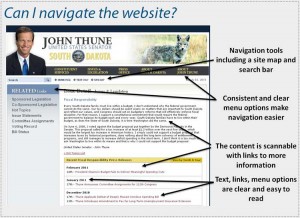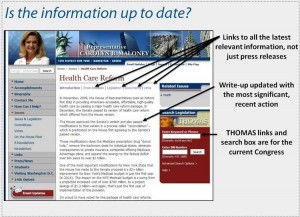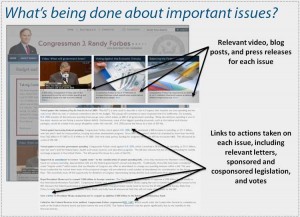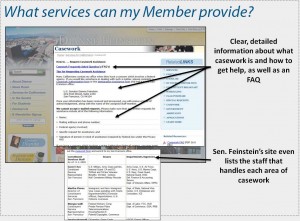Members of Congress are always coming up with new and innovative ways to engage citizens online, but no congressional office should neglect their website. After all, in our survey of over 10,000 citizens, we found that the website of the Senator or Representative is the one of the first places they turn for information. So it's essential that congressional websites provide at least a basic level of information and services. With limited time and resources, where should offices focus their efforts? Here are the 4 most critical areas to focus on, the questions to ask yourself as you improve your website, and examples from award winning websites from the 111th Congress:
1. Usability: 'Can I navigate the website and find what interests me even if I've never used the site before?'
All the content in the world is not going to be helpful to users if they cannot find what they are looking for. Because everyone has a different level of familiarity with the Internet, as well as with Congress and their own Representative or Senator, it is important that every website make its content as easy to find and as easy to navigate as possible. Senator John Thune's (R-SD) website is one example (click to enlarge):
2. Timeliness: 'Is the information on the website up to date?'
The Internet is a dynamic medium, and users expect up-to-date information. No matter how well-designed a site is or how extensive its content, it's not going to be useful for visitors if the information they find is no longer relevant or out-dated. It is important to keep your website populated with the most recent and significant information. Representative Carolyn Maloney's (D-NY) website is one example (click to enlarge):
3. Information on issues: 'What are the issues before Congress? What issues are important to the Member and the district or state and what's being done?'
All sites, regardless of their audiences, need to have information about legislative activities and the work of the office. This should include information about legislative issues of national, state, or local interest. One of a Member's primary responsibilities is to keep their constituents informed about his or her actions, and the website is a prime venue for doing so. Representative J. Randy Forbes' (R-VA) website is one example (click to enlarge):
4. Constituent services and casework: 'What services can my Member provide me with and how does the process work?'
Citizens typically access congressional websites for a specific reason. Seeking assistance from their Senators or Representative is one of them, whether it be help with a federal agencies, ordering a flag, scheduling a visit or tour, or finding an internship. Providing information and guidance about constituent services online, including answers to basic constituent service questions, should be an essential part of any Member's website. Senator Dianne Feinstein's (D-CA) is one example (click to enlarge):
For more examples and guidance download the handouts from our March House training (PDF) or Senate training (PDF).






